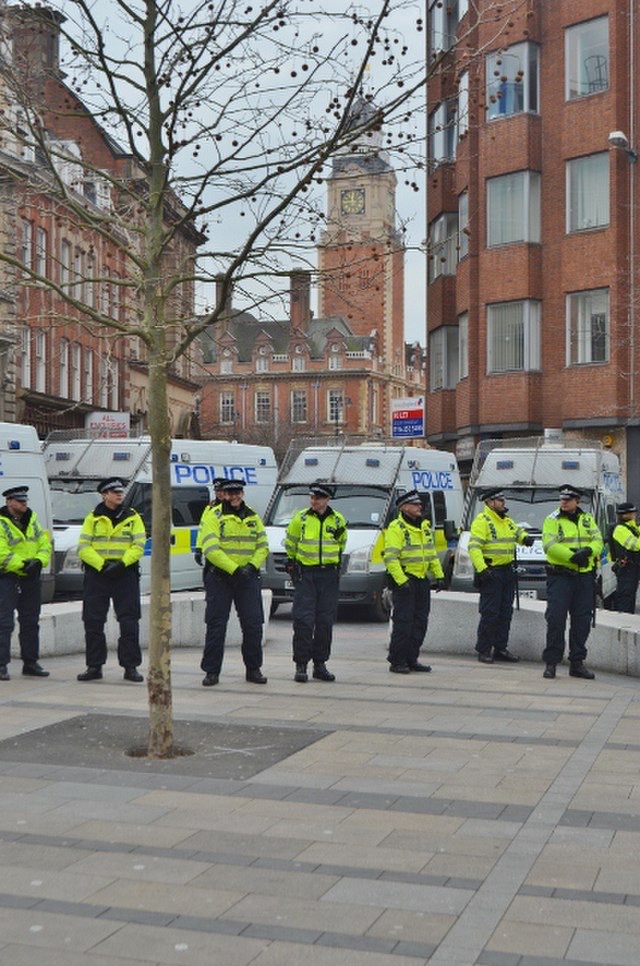A fresh wave of outrage has erupted in the UK following the arrest of a Jewish protester for holding a placard mocking a known terrorist leader. The incident has ignited a fierce national debate over what critics are calling “two-tier policing”—the notion that law enforcement applies different standards of justice based on political, religious, or cultural affiliations. In an already tense political climate, this episode has further polarized opinions and raised troubling questions about freedom of speech, selective enforcement, and community trust in policing.
The arrest took place during a pro-Israel demonstration in central London, where the individual—later identified as a member of a Jewish advocacy group—displayed a sign satirizing a senior figure from Hamas, labeled as a terrorist organization by the UK and several Western nations. Despite the provocative but non-violent nature of the protest, the individual was quickly detained by officers for alleged hate-related offenses.
This action sparked immediate backlash from various sectors, with critics accusing the police of bias and double standards, particularly in contrast to the treatment of certain pro-Palestinian protests, where similarly controversial signs and slogans have reportedly gone unpunished. Politicians, civil liberty organizations, and community leaders have all weighed in, some arguing that law enforcement is failing to act impartially, while others defend the police’s right to act on perceived threats to public order.
This case is more than just a one-off incident—it has become a flashpoint in a broader and deeply sensitive discussion about free expression, identity politics, and the role of police in mediating ideological conflict.
The incident occurred during a well-attended pro-Israel rally in London on May 19, 2025. The protester, described as a prominent member of a Jewish advocacy group, held a placard featuring a caricature of a Hamas leader alongside a sarcastic message. While provocative, the placard did not incite violence or hatred by legal standards. However, within moments, the individual was approached by police officers, questioned, and ultimately arrested on suspicion of committing a racially or religiously aggravated offense.
According to the Metropolitan police, the arrest was made “following multiple complaints from members of the public who found the placard offensive and potentially in breach of public order legislation.” Officers cited sections of the Public Order Act, which allows police to intervene when material is likely to stir up racial or religious hatred.
Yet critics argue that this justification is flimsy at best. The placard in question mocked a widely recognized terrorist leader—hardly a protected or sympathetic figure under UK law. Moreover, the protester made no direct threats or incitements of violence. Legal analysts and civil rights experts have since pointed out that satire, especially political satire, is strongly protected under the UK’s free speech laws. Arresting someone under such dubious pretenses sets a dangerous precedent, they warn.
The rapid escalation of the situation is what has many observers concerned. Within 20 minutes of unfurling the placard, the protester was in handcuffs, escorted by multiple officers, and removed from the area. Eyewitnesses report that some in the crowd booed the police while others looked on in disbelief. Videos of the arrest quickly went viral online, sparking a digital firestorm and drawing attention from media outlets across the country.
Following the arrest, the individual was held for several hours before being released on bail pending further investigation. However, within days, the Crown Prosecution Service announced that no charges would be pursued due to “insufficient evidence to support a realistic prospect of conviction.” That decision, while welcomed by free speech advocates, did little to quell the outrage over what many see as politically motivated policing.
Public and Political Reactions
The public response was immediate and heated. Social media erupted with hashtags like #TwoTierPolicing and #FreeSpeechCrisis trending across platforms. Conservative commentators and political figures were particularly vocal, accusing the Metropolitan Police of pandering to political correctness and selectively enforcing the law.
Nigel Farage, leader of the Reform UK party, tweeted, “This is what ‘two-tier policing’ looks like in real-time. A Jewish protester is arrested for mocking a terrorist, while radical slogans on the other side are ignored. The UK is losing its spine.” Other political figures echoed this sentiment, calling for a parliamentary inquiry into the policing of protests and public demonstrations.
The backlash wasn’t limited to the political right. Several civil liberties organizations, including Liberty and the Free Speech Union, issued strongly worded statements condemning the arrest. “We cannot allow the police to become arbiters of political speech,” said one statement. “Mocking a terrorist should never be a criminal offense in a democratic society.”
The Jewish community also expressed deep concern. Rabbi Jonathan Freedman, a well-known figure in interfaith dialogue, remarked, “This arrest sends a chilling message to Jewish citizens who feel increasingly marginalized. If criticizing terrorism is now a hate crime, then we must seriously question the direction our society is heading.”
Meanwhile, pro-Palestinian groups expressed mixed reactions. Some defended the police action, arguing that offensive imagery—regardless of the subject—can inflame tensions and should be carefully monitored. Others acknowledged the potential for double standards and called for a more consistent approach to protest policing across all communities.
The Metropolitan Police, for their part, issued a brief statement affirming their commitment to impartiality. “We enforce the law without fear or favor,” the statement read. “Our officers acted based on complaints received and in accordance with existing public order laws.” Still, many remain unconvinced, and the issue continues to fuel broader debates around the perceived erosion of civil liberties in the UK.



